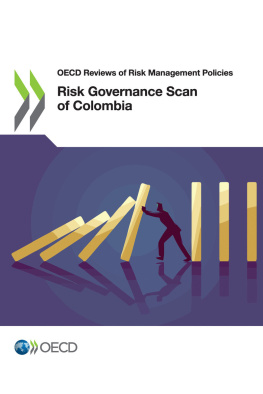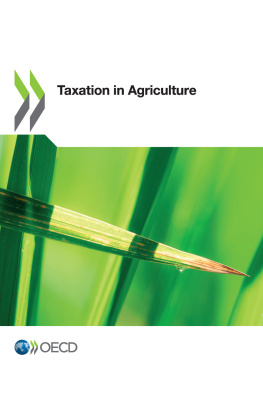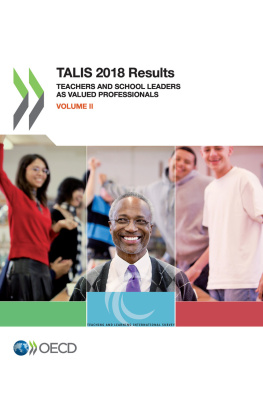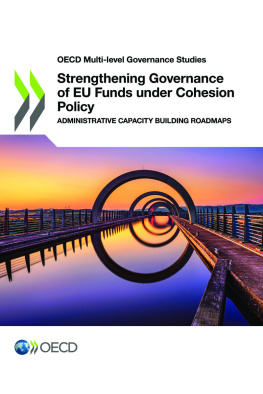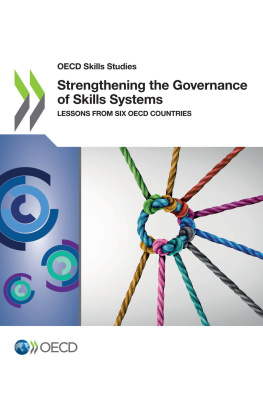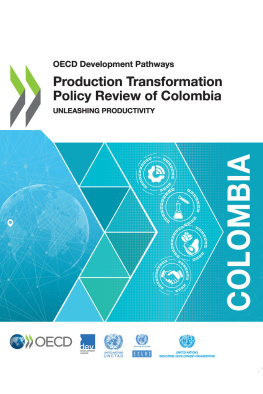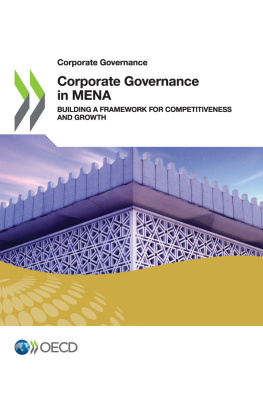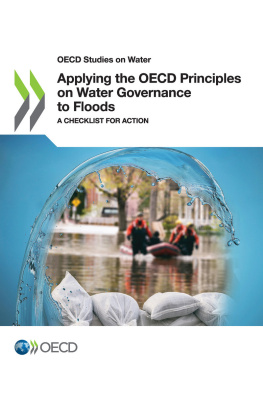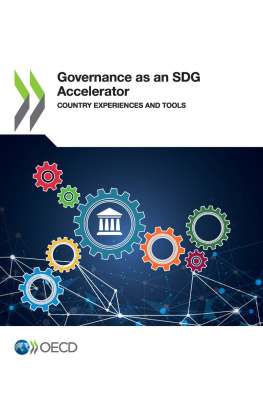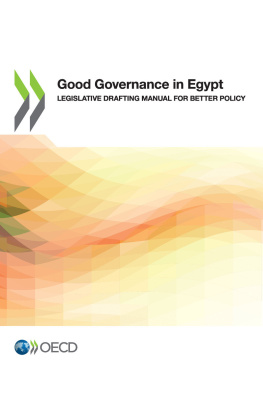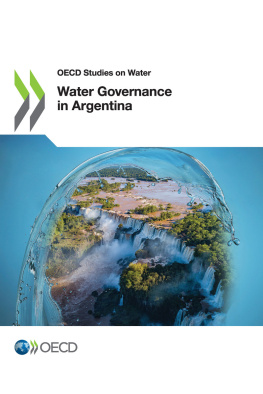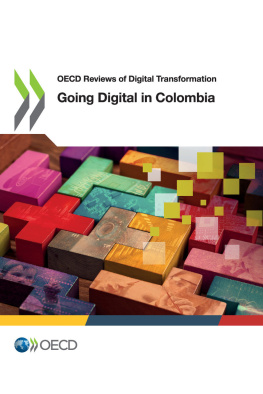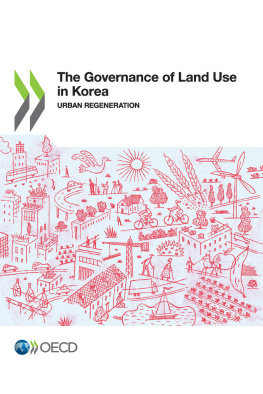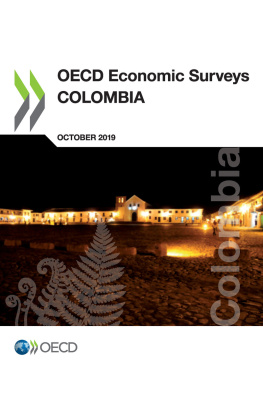OECD - Risk Governance Scan of Colombia
Here you can read online OECD - Risk Governance Scan of Colombia full text of the book (entire story) in english for free. Download pdf and epub, get meaning, cover and reviews about this ebook. year: 2019, publisher: OECD Publishing, genre: Business. Description of the work, (preface) as well as reviews are available. Best literature library LitArk.com created for fans of good reading and offers a wide selection of genres:
Romance novel
Science fiction
Adventure
Detective
Science
History
Home and family
Prose
Art
Politics
Computer
Non-fiction
Religion
Business
Children
Humor
Choose a favorite category and find really read worthwhile books. Enjoy immersion in the world of imagination, feel the emotions of the characters or learn something new for yourself, make an fascinating discovery.
Risk Governance Scan of Colombia: summary, description and annotation
We offer to read an annotation, description, summary or preface (depends on what the author of the book "Risk Governance Scan of Colombia" wrote himself). If you haven't found the necessary information about the book — write in the comments, we will try to find it.
OECD: author's other books
Who wrote Risk Governance Scan of Colombia? Find out the surname, the name of the author of the book and a list of all author's works by series.
Risk Governance Scan of Colombia — read online for free the complete book (whole text) full work
Below is the text of the book, divided by pages. System saving the place of the last page read, allows you to conveniently read the book "Risk Governance Scan of Colombia" online for free, without having to search again every time where you left off. Put a bookmark, and you can go to the page where you finished reading at any time.
Font size:
Interval:
Bookmark:
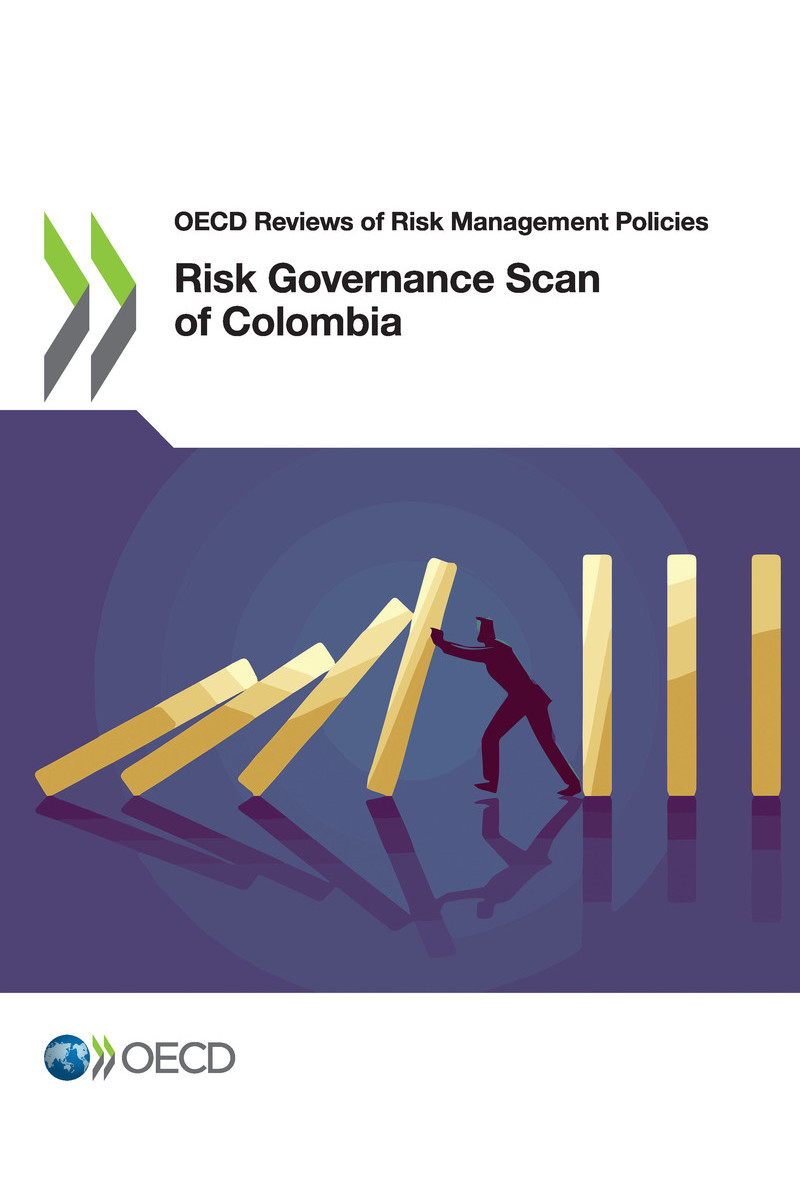
OECD (2019), Risk Governance Scan of Colombia , OECD Reviews of Risk Management Policies, OECD Publishing, Paris, https://doi.org/10.1787/eeb81954-en .
Colombia is one of the countries most exposed to natural disasters. Regularly recurring disasters such as floods and landslides cause an estimated USD 200 million in damages on an annual basis. During the 2010/11 La Nia phenomenon, damages were as high as USD 6.3 billion. As much as 80 percent of the population is exposed to two or more types of natural hazards, including many of the poorest in society. Decades of armed conflict, unplanned urbanisation, the rise of natural hazards that trigger technological accidents, and a recent flood of migrants all contribute to increasing social vulnerability and a changing risk landscape.
In 2012, Colombia launched ambitious reforms to improve its disaster risk management framework and ultimately strengthen the countrys resilience to disasters and interconnected risks. Colombia recognised the need to establish a comprehensive, multi-hazard risk management structure. It aims to mainstream disaster risk management across critical sectors at national and subnational level, and its objectives align well to the principles set out in the OECD Recommendation on the Governance of Critical Risks .
This OECD Risk Governance Scan provides the first assessment of progress, identifying gaps and recommendations to further strengthen Colombias disaster risk management system. It is part of a series of OECD Reviews of Risk Management Policies, including similar studies on France, Italy, Japan, Kazakhstan, Morocco and Mexico. It was prepared under the auspices of the OECDs High Level Risk Forum, which promotes an integrated, whole-of-government approach to disaster risk management and governance. The Forum brings together policy makers from governments, practitioners from the private sector and civil society, and experts from think tanks and academia, to identify and share good risk governance and management practices. The work of the Forum is underpinned by the OECD Recommendation of the Council on the Governance of Critical Risks , which forms the analytical framework for the present report.
Colombias National Unit for Disaster Risk Management provides strategic guidance and coordination of disaster risk management actions across government ministries. Under its stewardship, stakeholders have shown strong commitment to the reform agenda and made substantial progress in setting disaster risk management objectives.
The Scan finds that, while Colombia has gained much ground in understanding the risks faced by its communities and economic activities, more granular knowledge and risk assessments could be developed at sub-national levels and leveraged in the risk management decisions of municipalities. To prevent risk exposure from increasing, the country also needs to address land-use issues in disaster prone areas. There are untapped opportunities for Colombia to use the disaster recovery and reconstruction phases to incorporate resilience measures and change path dependencies that perpetuate disaster risk exposures.
This Disaster Risk Governance Scan of Colombia was prepared under the auspices of the OECD High Level Risk Forum by the OECD Directorate for Public Governance, led by Marcos Bonturi, and with support from Colombias National Unit for Disaster Risk Management (UNGRD), under the leadership of Eduardo Jos Gonzlez Angulo and previously Carlos Ivn Mrquez Prez.
The project was managed by Catherine Gamper, who co-authored the report with Teresa Maria Deubelli, under the supervision of Stphane Jacobzone, Deputy Head, Reform of the Public Sector, and Jack Radisch, Senior Project Manager. The Secretariat is grateful for comments and suggestions received from OECD colleagues, including Charles Baubion (Directorate for Public Governance), Leigh Wolfrom (Directorate for Financial and Enterprise Affairs) and Mamiko Yokoi-Arai (Directorate for Financial and Enterprise Affairs). Andres Aponte provided valuable research assistance. The authors benefitted from expertise and insights from Nestor Alfonzo.
The Secretariat would like to thank the team within Colombias National Unit for Disaster Risk Management that helped engaged the stakeholders in the National System for Disaster Risk Management and facilitated the information-gathering and fact-checking process. We would like to thank in particular Lina Paola Martnez Fajardo, Maria Jimena Pantoja Castrillon and Antonio Lopez. The OECD Secretariat would like to thank all stakeholders in Colombias National System for Disaster Risk Management for their availability and engagement throughout the project (see ). Their participation in the launch event on 3 May 2018 in Bogota, their input through a series of interviews held in June 2018, as well as their responses to the questionnaire, were essential for this report.
Jennifer Allain edited and prepared the report for publication. Assistance was also provided by Liv Gaunt and Raquel Paramo. The team is very grateful for assistance provided by Elisabeth Huggard and Javier Gonzalez throughout the project.
Font size:
Interval:
Bookmark:
Similar books «Risk Governance Scan of Colombia»
Look at similar books to Risk Governance Scan of Colombia. We have selected literature similar in name and meaning in the hope of providing readers with more options to find new, interesting, not yet read works.
Discussion, reviews of the book Risk Governance Scan of Colombia and just readers' own opinions. Leave your comments, write what you think about the work, its meaning or the main characters. Specify what exactly you liked and what you didn't like, and why you think so.

